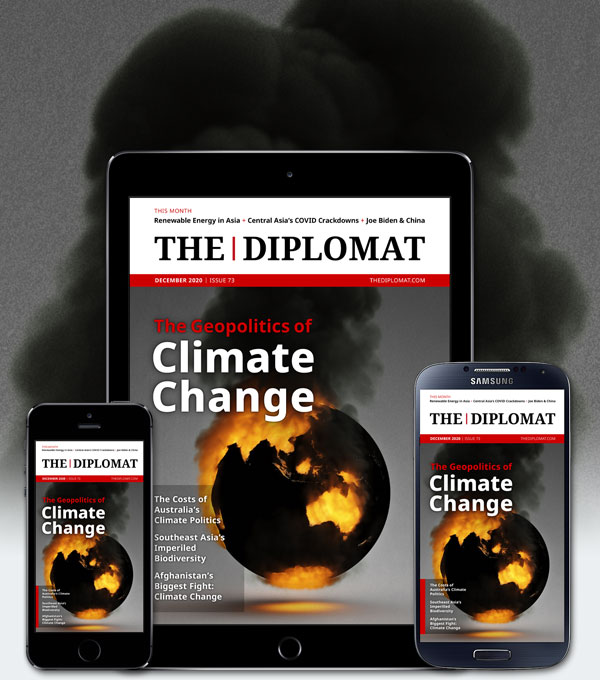| Welcome to the latest issue of Diplomat Brief. This week our top story pays a visit to farmers protesting along a highway outside of New Delhi. We also have an interview with Geoffrey F. Gresh, a professor of international relations at the National Defense University in Washington, DC, about maritime competition in Eurasia. |
| Story of the week |  | POLITICS Inside India’s Farmer ProtestWhat Happened: Thousands of Indian farmers have been camped out along a highway near New Delhi for nearly two weeks, protesting against new agricultural reforms they say will worsen farmers’ plight. The Modi government, however, says the laws will actually increase farmers’ profits thanks to new options for selling their produce. Our Focus: “We are fully prepared and are ready to face every circumstance,” one protester, Kuldeep Singh, told The Diplomat. “We want these reforms to be changed, till then we will not leave this place.” What Comes Next: Government attempts at assuaging concerns thus far have been unsuccessful and the protesters are dug in for the long haul – even as winter sets in and COVID-19 continues to spread across India. Meanwhile, critics have already denounced the use of water cannons and tear gas against the protesters. Can the government and farmers reach a peaceful resolution? Read this story |
| Behind the News | Interview Geoffrey F. GreshGeoffrey F. Gresh, author of the book “To Rule Eurasia’s Waves: The New Great Power Competition at Sea,” on small nations’ role in maritime competition: “Some of the countries I think about in this space are the Indian Ocean island nations such as Sri Lanka, the Maldives, Mauritius, and the Seychelles... If some of these smaller island nations pushed for greater sea denial capabilities, it could potentially pose significant, albeit undesired, outcomes that are counterproductive.” Read the interview |
| This Week in Asia | Northeast Asia Japanese, Chinese Space Missions Hit MilestonesOn December 6, a Japanese spacecraft successfully deposited rare asteroid samples on Earth. The Hayabusa2 will now head to a still more distant asteroid, continuing a mission that began in 2014. Meanwhile, China’s Chang’e 5 mission has successfully retrieved samples from the moon and redocked in lunar orbit. The spacecraft is expected to head back to Earth on December 13, bringing with it the first new lunar samples in over 45 years. Amid the deserved congratulations, however, beware of reading too much into China’s moon ambitions. Find out more | South Asia The U.K.’s Top Diplomat Comes to IndiaBritish Foreign Secretary Dominic Raab is expected to arrive on a two-day visit to India on December 16 as his country seeks to position itself as an Indo-Pacific power post-Brexit. In recent months, Britain has asserted itself as a player in the region by, among other things, siding with Australia in its push against China but also by announcing a dramatic increase in its defense budget. However, some remain cautious about Britain's ability to walk the walk given serious uncertainty about its post-Brexit, post-pandemic economic future. Find out more | Southeast Asia Indonesia’s Regional ElectionsThis week, Indonesians will go to the polls for important regional elections, in which they will select the leaders of nine provinces, 224 regencies, and 37 cities across the archipelago. But they will do so amid a swell of COVID-19 infections that already postponed the elections once, and now threatens to undercut Indonesia’s traditionally high voter turnout. Find out more | Central Asia Kyrgyzstan’s Acting President Goes to MoscowThis week, Kyrgyzstan's acting president – Talant Mamytov, Sadyr Japarov’s longtime ally – was in Moscow to meet the chairman of the State Duma and discuss Kyrgyz-Russian relations. The visit seemed to cement Russian approval for the political trajectory in Kyrgyzstan: arcing toward a strong presidential system. Keep an eye on Japarov, the top contender, as the January 10 presidential election rapidly approaches. Find out more |
| Word of the Week | SOCIETY 언택트“Untact”: A Korean neologism, meaning “contactless,” coined during the isolation of COVID-19. The word is often used when new advances in technology allow for experiences to go virtual. Find out more |
|  |




